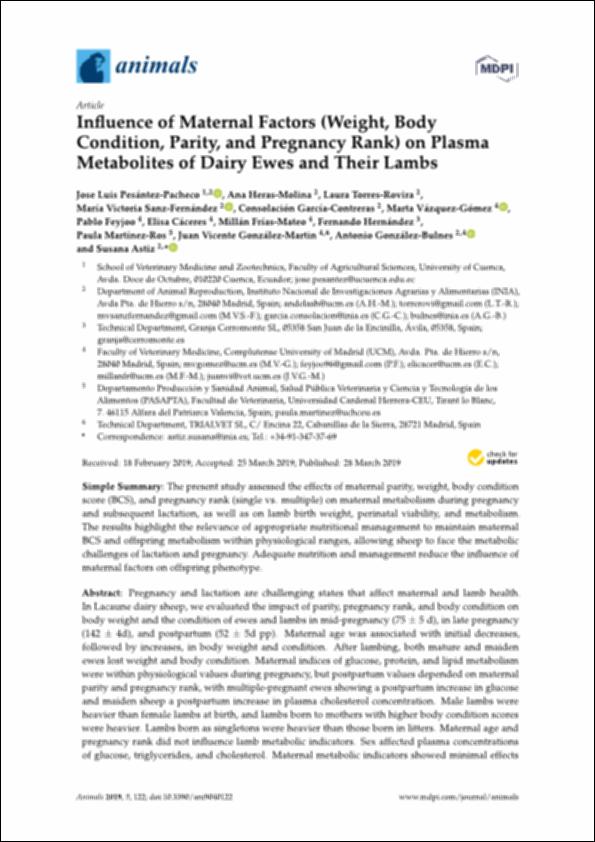Por favor, use este identificador para citar o enlazar este ítem:
http://hdl.handle.net/10637/10603Influence of maternal factors (weight, body condition, parity, and pregnancy rank) on plasma metabolites of dairy ewes and their lambs
| Título : | Influence of maternal factors (weight, body condition, parity, and pregnancy rank) on plasma metabolites of dairy ewes and their lambs |
| Autor : | Pesántez Pacheco, José Luis Heras Molina, Ana Torres Rovira, Laura Sanz Fernández, María Victoria García Contreras, Consolación Vázquez Gómez, Marta Feyjoo, Pablo Cáceres, Elisa Frías Mateo, Millán Hernández, Fernando Martínez Ros, Paula González Martin, Juan Vicente González de Bulnes López, Antonio Astiz Blanco, Susana |
| Materias: | Nutrición animal.; Ovejas para leche - Alimentación.; Sheep milk - Production.; Animal nutrition.; Sheep milk - Metabolism.; Leche de oveja - Producción.; Metabolismo animal.; Animal metabolism.; Ovejas para leche - Metabolismo.; Sheep milk - Feeding and feeds. |
| Editorial : | MDPI |
| Citación : | Pesántez-Pacheco, JL., Heras-Molina, A., Torres-Rovira, L., Sanz-Fernández, MV., García-Contreras, C., Vázquez-Gómez, M. et al. (2019). Influence of maternal factors (weight, body condition, parity, and pregnancy rank) on plasma metabolites of dairy ewes and their lambs. Animals, vol. 9, n. 4 (28 mar. 2019), art. 122. DOI: https://doi.org/10.3390/ani9040122 |
| Resumen : | Pregnancy and lactation are challenging states that affect maternal and lamb health. In Lacaune dairy sheep, we evaluated the impact of parity, pregnancy rank, and body condition on body weight and the condition of ewes and lambs in mid-pregnancy (75 5 d), in late pregnancy (142 4d), and postpartum (52 5d pp). Maternal age was associated with initial decreases, followed by increases, in body weight and condition. After lambing, both mature and maiden ewes lost weight and body condition. Maternal indices of glucose, protein, and lipid metabolism were within physiological values during pregnancy, but postpartum values depended on maternal parity and pregnancy rank, with multiple-pregnant ewes showing a postpartum increase in glucose and maiden sheep a postpartum increase in plasma cholesterol concentration. Male lambs were heavier than female lambs at birth, and lambs born to mothers with higher body condition scores were heavier. Lambs born as singletons were heavier than those born in litters. Maternal age and pregnancy rank did not influence lamb metabolic indicators. Sex affected plasma concentrations of glucose, triglycerides, and cholesterol. Maternal metabolic indicators showed minimal effects on lamb phenotype. These results suggest that, when appropriately fed, dairy sheep can cover the metabolic demands of pregnancy and milk production, regardless of age and pregnancy rank. |
| Descripción : | Este artículo se encuentra disponible en la siguiente URL: https://www.mdpi.com/2076-2615/9/4/122 Este artículo pertenece al número especial "Reproductive Management of Sheep and Goats". |
| URI : | http://hdl.handle.net/10637/10603 |
| Derechos: | http://creativecommons.org/licenses/by/4.0/deed.es |
| ISSN : | 2076-2615 (Electrónico) |
| Fecha de publicación : | 28-mar-2019 |
| Centro : | Universidad Cardenal Herrera-CEU |
| Aparece en las colecciones: | Dpto. Producción y Sanidad Animal, Salud Pública Veterinaria y Ciencia y Tecnología de los Alimentos |
Los ítems de DSpace están protegidos por copyright, con todos los derechos reservados, a menos que se indique lo contrario.


